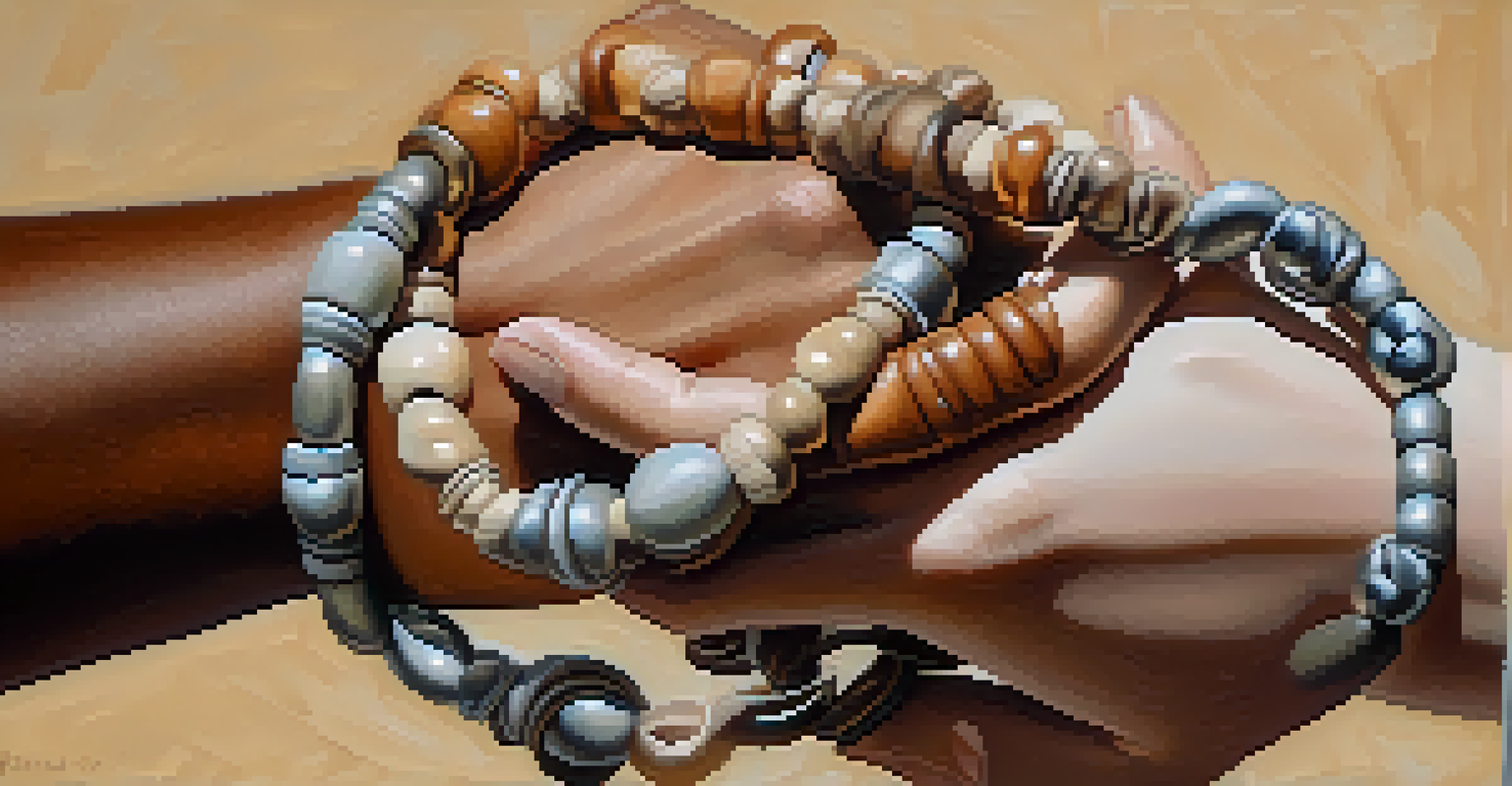Hallucinogens: Enhancing or Harming Interpersonal Trust?

Understanding Hallucinogens and Their Effects
Hallucinogens are substances that alter perception, mood, and cognitive processes. Common examples include LSD, psilocybin (magic mushrooms), and DMT. These substances can create intense sensory experiences and even lead to altered states of consciousness.
The mind is everything. What you think you become.
While many people associate these experiences with personal insight or creativity, the effects can vary greatly among individuals. Some report feelings of euphoria and connectedness, while others may experience anxiety or paranoia. This variability raises questions about their impact on social dynamics.
As we delve into the effects of hallucinogens, it's essential to consider both the psychological and social implications. Are these substances merely tools for self-exploration, or do they play a more substantial role in shaping interpersonal relationships?
The Positive Side: Enhancing Interpersonal Trust
Interestingly, some studies suggest that hallucinogens can enhance feelings of trust and empathy among users. For instance, research indicates that the psychedelic experience often fosters a sense of connectedness with others, which can lead to more profound social bonds. Imagine sitting around a campfire, sharing stories, and feeling an overwhelming sense of unity with your friends.

Many users report that hallucinogens allow them to view their relationships from new perspectives, often leading to reconciliations or deeper understandings. This shift in perception can create an environment where trust flourishes, as individuals feel more open and vulnerable with one another. The communal experience can also break down barriers that usually hinder authentic relationships.
Hallucinogens Can Build Trust
Certain hallucinogens may enhance feelings of trust and empathy among users, fostering deeper social connections.
However, while these positive effects are compelling, they also raise questions about the sustainability of trust formed under such altered states. Does the trust built during a psychedelic experience hold up in the sober light of day?
The Dark Side: Potential Risks to Trust
On the flip side, hallucinogens can lead to adverse experiences that may harm interpersonal trust. For some individuals, these substances can trigger negative emotions or delusions, causing rifts in relationships. Imagine a friend becoming paranoid during a trip, creating a divide that didn't exist before.
We do not see things as they are, we see them as we are.
Additionally, the unpredictability of hallucinogenic experiences can lead to misunderstandings and conflicts. A person might interpret a benign comment as a personal attack while under the influence, leading to resentment or distrust. These moments can have lasting effects, impacting how friends or partners relate to one another.
Moreover, the temporary nature of trust fostered by hallucinogens can create a false sense of security. Once the effects wear off, the underlying issues in a relationship might resurface, leading to disappointment and a breakdown in trust.
Cultural Perspectives on Hallucinogens and Trust
Cultural context plays a crucial role in shaping perceptions of hallucinogens and their impact on trust. In some indigenous cultures, these substances are used in ceremonial settings to enhance communal bonds and foster spiritual connections. For them, hallucinogens can be seen as sacred tools for deepening interpersonal trust.
Conversely, in many Western societies, hallucinogens are stigmatized and associated with negative connotations. This cultural bias can affect how relationships are viewed when one or both parties have used these substances. The fear of judgment may lead to secrecy or dishonesty, further eroding trust.
Risks of Trust Under Influence
While hallucinogens can create temporary feelings of trust, they may also lead to misunderstandings and long-term relationship issues.
Understanding these cultural nuances is essential when discussing hallucinogens and trust. It's not just about the substances themselves but also how societal views influence the dynamics of relationships.
Psychological Mechanisms Behind Trust Enhancement
Research suggests that hallucinogens may affect neurotransmitters like serotonin, which plays a significant role in mood regulation and social behavior. This alteration can create feelings of openness and vulnerability, encouraging individuals to engage more fully with one another. It's as if the usual filters we have are temporarily lifted, allowing for deeper connections.
Additionally, the introspective nature of hallucinogenic experiences can lead to personal growth, which may enhance one's ability to trust others. When individuals confront their fears and insecurities, they may find themselves more willing to extend trust to those around them. Think of it as a personal reset button, enabling healthier relationships.
However, the psychological effects can vary widely. While some may emerge from their experiences with newfound trust and understanding, others may find themselves grappling with fear or anxiety, which can hinder relationship building.
Therapeutic Uses of Hallucinogens and Trust
In recent years, there has been a resurgence of interest in the therapeutic potential of hallucinogens. Some studies suggest that these substances can facilitate trust between therapists and patients, enhancing the therapeutic alliance. Imagine a therapy session where both parties feel a profound connection, leading to breakthroughs in treatment.
This therapeutic approach often emphasizes the importance of setting and guidance, which can create a safe space for trust to flourish. When individuals feel supported and understood, they are more likely to open up about their vulnerabilities, leading to deeper healing.
Cultural Views Shape Trust Dynamics
Cultural perspectives significantly influence how hallucinogens are perceived and their impact on interpersonal trust.
However, this approach also necessitates careful consideration. The relationship between therapist and patient is inherently sensitive, and any disruption in trust—whether induced by the substance or the therapeutic process—can have significant repercussions.
Navigating the Balance: Trust in the Age of Hallucinogens
As we explore the complex relationship between hallucinogens and interpersonal trust, it's clear that the effects are multifaceted. While these substances can enhance feelings of connection, they also carry risks that can undermine trust. Striking a balance is essential for individuals considering their use.
Engaging in open, honest conversations about intentions and experiences can help mitigate potential negative outcomes. Establishing trust before using hallucinogens can create a stronger foundation for navigating the highs and lows of the experience together. It's like going on an adventure; having a reliable companion makes the journey more rewarding.

Ultimately, the impact of hallucinogens on trust is a personal journey that varies from one individual to another. By approaching the topic with care and consideration, we can better understand how these substances shape our relationships.